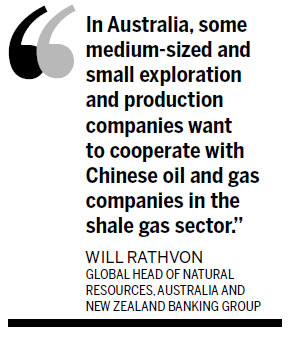Chinese investors focus on Australia's shale gas
Updated: 2013-11-05 07:10
By Du Juan in Tianjin (China Daily)
|
|||||||||||

Australia is a good potential investment target in the shale gas sector for Chinese companies as the domestic industry hopes that its own developments there can help meet soaring demand, according to several experts in the field.
"It is a good idea to invest in Australia's shale gas business in terms of its geology and transportation to China, as well as the size of the resource opportunity and the likelihood that these new gas sources will drive the expansion of liquefied natural gas projects," said Will Rathvon, global head of Natural Resources with Australia and New Zealand Banking Group Ltd.
Australia has mature infrastructure and technology for shale gas development. Land prices in Australia are much cheaper than in the United States, which can be a good choice for the Chinese investors, he said.
China's top three oil and gas companies - CNOOC Ltd, PetroChina Co and Sinopec Co - have all invested in Australia's LNG market, which is seen as good preparation for shale gas investments as the shale resources must be converted to LNG for China delivery.
"In Australia, some medium-sized and small exploration and production companies want to cooperate with Chinese oil and gas companies in the shale gas sector," Rathvon said. "They own sizable shale gas acreage, and ANZ can connect these people."
According to the Australian Research Council, the country has considerable shale gas resources, but there is a high degree of uncertainty attached to them.
"The commonly cited undiscovered resource value of 396 trillion cubic feet of gas is based on only four basins. But if all prospective basins are considered, the undiscovered resource could be in excess of 1,000 trillion cubic feet," the council reported.
Reliable economic reserve figures for shale gas were not available, largely because there has been little or no exploration or drilling in most basins, the report said.
It estimated that companies will invest about $500 million in shale gas development in Australia in the next two years.
"China has been investing in Australia, and we expect such investments to continue to grow, especially in the oil and gas sector," said Rathvon.
"However, there are also issues that the companies have to consider when looking at investing. One is the cost of converting natural gas into LNG, and the other is that labor costs in Australia are higher than they are in the US."
As China's natural gas consumption continues to rise due to economic growth and the government's commitment to carbon reduction, alternative energy sources, such as shale gas, have grown in popularity.
However, China's shale gas exploration is still at a preliminary stage, with issues in terms of geological condition, water consumption and technology.
China's shale gas development faces several obstacles, said Li Boshu, a senior researcher with the domestic energy information and consulting service provider China Energy Net Consulting Co.
A lack of supervision and management in the sector is the biggest issue, and the country doesn't have a clear plan for its shale gas development, Li said.
"I don't think subsidies can ensure the success of an industry," Li said. "Although China has carried out subsidies relative to shale gas development, I'd consider it as a positive signal for the industry that the government encourages companies to participate in the sector."
Related Stories
Shale gas guidelines stress subsidies, fee waivers 2013-10-31 07:14
Shale gas sector gears up in China 2013-10-19 08:26
China can learn from US in shale gas exploration 2013-10-12 12:55
Third round of shale gas bidding 'set to start' 2013-10-11 17:31
CNPC building China's first shale gas pipeline 2013-06-19 21:11
Shale gas deal just the start for China: Officials 2013-03-29 07:45
Today's Top News
Report highlights smog effects
Luxury shoppers get more sophisticated
Li urges farmers to plant more in 2014
Xi calls for targeted policies to fight poverty
Separatists spreading skills online
New warning on overcapacity
Govt must enact land reform
US dismisses Snowden's plea
Hot Topics
Lunar probe , China growth forecasts, Emission rules get tougher, China seen through 'colored lens', International board,
Editor's Picks

|

|

|

|

|

|





